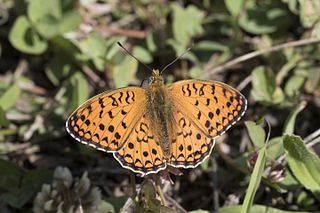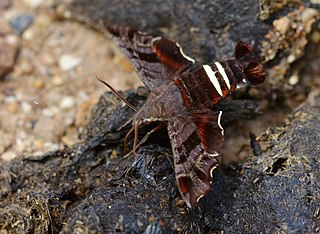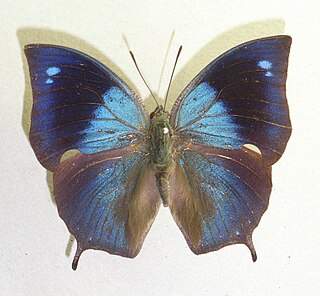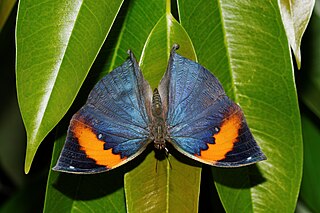
The Niobe fritillary is a species of butterfly in the family Nymphalidae.

The Charaxinae, the leafwings, are a nymphalid subfamily of butterflies that includes about 400 species, inhabiting mainly the tropics, although some species extend into temperate regions in North America, Europe, China, and southern Australia. Significant variations exist between the species. For example, some are medium sized and bright orange above, but mottled gray or brown below. This underwing coloration helps them resemble a dead leaf when they are at rest, as they keep their wings closed. With relatively few exceptions, the hindwings of the members of this subfamily have jagged edges.

Doleschallia bisaltide, the autumn leaf, is a nymphalid butterfly found in South Asia, Southeast Asia, and Australasia. In Australia it is also known as the leafwing.

Prepona is a genus of Neotropical charaxine butterflies in the family Nymphalidae. They are strong fliers in tropical forests where they feed on fermenting fruits and animal dung. The underside of the wings is pale greyish or brownish, while the upperside is dark with distinct iridescent blue markings. A few species also have orange markings on the upperside of the wings. They are popular among butterfly collectors.

Theretra nessus, the yam hawk moth, is a moth of the family Sphingidae. It was described by Dru Drury in 1773.

Amphion floridensis, the Nessus sphinx, is a day-flying moth of the family Sphingidae. The species was described by Pieter Cramer in 1777, and renamed in 1920. It is the only member of the genus Amphion erected by Jacob Hübner in 1819. It lives throughout the eastern United States and Canada and occasionally south into Mexico, and is one of the more commonly encountered day-flying moths in the region, easily recognized by the two bright-yellow bands across the abdomen.

Erebia ligea, the Arran brown, is a member of the subfamily Satyrinae of the family Nymphalidae. This brown is widespread in south-eastern and northern Europe. It prefers mixed woodlands at low altitudes. It is rarely seen in open areas. This species was first described by Carl Linnaeus in his 1758 10th edition of Systema Naturae, and the type locality is Sweden.

Anaea aidea, the tropical leafwing, is a species of brush-footed butterfly in the subfamily Charaxinae. Its native range extends from Mexico to northwestern Costa Rica, with strays sometimes seen in southern Texas, Arizona, and California in the United States. Some authors consider Anaea aidea to be a subspecies of Anaea troglodyta.

Memphis, described by Jacob Hübner in 1819, is a Neotropical nymphalid butterfly genus in the subfamily Charaxinae.

Danaus eresimus, the soldier or tropical queen, is a North American, Caribbean, and South American butterfly in the family Nymphalidae.

Kallima, known as the oakleaf or oak leaf butterflies, is a genus of butterflies of the subfamily Nymphalinae in the family Nymphalidae. They are found in east, south and southeast Asia. Their common name is a reference to the lower surface of their wings, which is various shades of brown like a dead leaf.

Kallima paralekta, the Indian leafwing or Malayan leafwing, is a species of brush-footed butterfly of the genus Kallima. Despite its common names, it is not found in India or Malaysia, but is endemic to Java and Sumatra of Indonesia. Like other members of its genus, it is remarkable for its strong resemblance to a dead leaf when its wings are folded. It was one of the species encountered by the British naturalist Alfred Russel Wallace in his travels in maritime Southeast Asia. It is mentioned in his famous 19th-century work The Malay Archipelago as one of the best examples of protective camouflage achieved through natural selection.

Fountainea nobilis, the noble leafwing, is a species of Neotropical butterfly belonging to the family Nymphalidae, Charaxinae subfamily.

Hypna is a butterfly genus of the family Nymphalidae. It is monotypic, containing only Hypna clytemnestra, the jazzy leafwing, marbled leafwing or silver-studded leafwing.

Siderone is a Neotropical nymphalid butterfly genus in the subfamily Charaxinae.

Zaretis itys, the skeletonized leafwing or leaf wing butterfly, is a Neotropical nymphalid butterfly genus in the subfamily Charaxinae.

Anaea are a genus of charaxine butterflies in the brush-footed butterfly family Nymphalidae. The butterflies are commonly known as leafwings. Members of the genus are found throughout the United States, Central America, and the Caribbean.



















